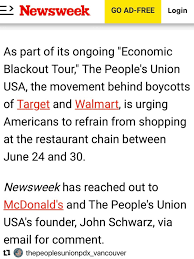
Introduction
In recent months, the fast-food giant McDonald’s has faced mounting pressure from various activist groups and concerned consumers, leading to a significant boycott movement. This boycott is rooted in rising discontent regarding the company’s labor practices, environmental sustainability, and corporate responsibility. As more customers join the cause, the implications for McDonald’s could be profound, potentially affecting sales, corporate policies, and the broader fast-food landscape.
Details of the Boycott
The McDonald’s boycott campaign has gained traction particularly in North America and Western Europe. Advocates for the boycott cite several reasons, including low wages, poor working conditions, and treatment of employees during the COVID-19 pandemic. Labor unions and independent workers’ rights groups have stressed the importance of fair pay and dignified working conditions, calling McDonald’s to account for their practices.
Moreover, environmental concerns have pushed some consumers to reconsider their support of the brand. Activists have pointed out that McDonald’s has been slow to adopt sustainable practices, especially regarding its sourcing of beef and palm oil, which are linked to deforestation and greenhouse gas emissions. As climate change becomes an increasingly pressing issue, consumers—particularly younger generations—are placing a higher premium on brands that are environmentally responsible.
Notable Events
In July 2023, protests were organized in major cities including Toronto, Vancouver, and Montreal, where demonstrators gathered outside McDonald’s locations to voice their discontent with the company’s practices. Many participants carried signs highlighting key issues, ranging from wage theft to environmental destruction. The protests received media coverage, amplifying the call for other consumers to join the boycott.
Moreover, several popular social media platforms have seen a surge in posts related to the boycott, with hashtags such as #BoycottMcDonalds and #FairWages trending among users seeking to raise awareness and mobilize support.
Conclusion
As the McDonald’s boycott continues to gain momentum, its impact on the corporation remains to be seen. If consumer dissatisfaction persists, there may be significant repercussions for McDonald’s in terms of sales and public image. Experts suggest that the company will need to adapt to this changing consumer sentiment by addressing the concerns raised by activists and demonstrating a commitment to ethical and sustainable practices. For consumers, this boycott presents a unique opportunity to advocate for change within the fast-food industry and encourage corporations to prioritize ethical treatment and environmental responsibility as core values in their operations.



